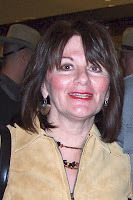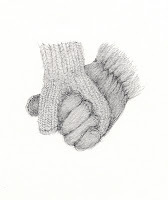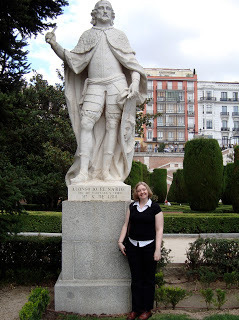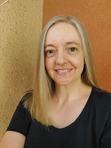Jessica Knauss's Blog, page 74
December 3, 2010
Without Language in Córdoba
 "Without Language in Córdoba" is one of my favorite poems I ever wrote. Now you can read it in its entirety in the amazingly high quality Apparatus Magazine! Please also see a photographic preview at YouTube.
"Without Language in Córdoba" is one of my favorite poems I ever wrote. Now you can read it in its entirety in the amazingly high quality Apparatus Magazine! Please also see a photographic preview at YouTube.The theme of the issue is "Translation," a theme dear to my heart. Interpreted widely, it pertains to people trying to communicate in any way they can, and so encompasses most of human experience.
The poem came to me during a study abroad experience in Córdoba, Spain. As we realized more every day after we got there, Córdoba was the original melting pot. In spite of the discomforts it implied, the blending of peoples, languages and cultures created an experience so astoundingly beautiful, it can still be felt today in the air that passes through.
My room mate (and best friend) was having a tough time. She loved Spain (I like to think I had something to do with that) but October is always emotionally raw for her. One day she just got up and went for a walk while it was still dark outside, and contemplated the serenity of the Roman Bridge in the early morning light. By the time I woke up, she was back and telling me about the adventures she'd had. Anywhere else, they might have been commonplace, but the setting made them almost mystical.
 Only my friend can say what parts of her walk I made up myself for the poem. I've forgotten, because with time, the poem becomes the reality. "Without Language in Córdoba" honors her expedition: the finding of something extraordinary right there in her surroundings; the way she felt she was beginning to belong to this place she had arrived in only weeks before; and, a personal favorite theme, the inability of words (in any language) to fully comprehend experience. With that in mind, I use empty space and translations of place names that seemed comical to us at the time, and leave "madrugada" (sunrise, daybreak, etc) untranslated. I had fun dicing up words to show their origins: "break/ fast."
Only my friend can say what parts of her walk I made up myself for the poem. I've forgotten, because with time, the poem becomes the reality. "Without Language in Córdoba" honors her expedition: the finding of something extraordinary right there in her surroundings; the way she felt she was beginning to belong to this place she had arrived in only weeks before; and, a personal favorite theme, the inability of words (in any language) to fully comprehend experience. With that in mind, I use empty space and translations of place names that seemed comical to us at the time, and leave "madrugada" (sunrise, daybreak, etc) untranslated. I had fun dicing up words to show their origins: "break/ fast."In workshop, the other members were sorely disappointed to hear that I wasn't writing about something that happened to me personally. I think one of them claimed she would continue pretending. That's absolutely fine. I don't think the poem is injured, no matter who the subject is. What is imagination for if not to bring vivid experiences to people who never had them?
Take a look at the poem here. I'll also add the link to my "famous publications" page.
"Without Language in Córdoba" is one of the centerpieces of my collection Dusk Before Dawn .

Published on December 03, 2010 01:17
December 1, 2010
Things and Ghosts
The hardest part about making this recent move was leaving most of my things -- books, files, furniture, and homey amusements -- in storage, taking with us to Arizona only what would fit into our compact car.
I'm not especially materialistic, but my stuff has a way of making me feel comfortable, like I'm in the right place, and that the creativity can flow. I was terribly envious of Barbara Briggs Ward's setup when she told me about it for her November 26 interview! Imagine, a place to settle down, to have a chance to position objects to their best advantage, to remain undisturbed.
One reason objects help me feel at home is that just about everything in my household has its own story, and those are important parts of my story. For example, a slightly battered, ordinary-looking floor lamp I've left in storage in Pennsylvania came to me when I moved into a studio apartment for the first time. When I first got to Boston, I moved in with room mates from some long-forgotten listing service, and all the lighting was already in the house. A very kind supervisor of mine had agreed to drive me over to the new place because I didn't have a car and the movers claimed they couldn't bring me with them in the cab. So all four of us drove ahead of the movers that day: Margie's husband, Margie (my supervisor), me, and the lamp she no longer needed, because she didn't want me to be in the dark in the new place. So, since September 2001, that lamp has been known as "Margie's lamp" in honor of her kindness, and no way would I willingly give it up. When I look at it, I see Margie and all the good times we had at that wonderful job.
Other objects contain within them the spirit of authority. When my grandmother gave me a set of kitchen utensils for my first wedding in 2004, she said, "That is the best whisk you will ever use." No ifs, ands, or buts. That whisk still receives the utmost respect and care, and in my house, it is known as "The Best Whisk in the World," when it's not languishing in storage, that is. Thanks, Grama. I think of you every time I use any of those utensils.
I drove my husband crazy during the moving process. Every time he would pick up a seemingly worthless object, I would cry, "I got that in Spain!" or recite some more complex history, plain as day to me, and he would know that it was too important to throw away. I love my husband beyond belief, but we are opposites in this regard. He's moved so many times that he has whittled his possessions down to the utterly necessary. If it weren't for me, he could pack up and leave in a sub-compact car in about two hours. He says the memories are in his head. His past is never in evidence, and I'm sure that's one reason he's so eternally ageless to me.
His attitude seems very healthy, whereas I have always considered memory to be outside myself. Consider the wonders logged in my childhood diaries: events I would never have been able to recall, in full detail! Also, my paternal grandmother died after the protracted horror that is Alzheimer's disease, and my dad was diagnosed with early onset dementia seven years ago, practically securing a similar fate for him. I always think that if I were to meet with that demon, my things and all the memories they so obviously contain would help me recognize the world and maybe stay in it a little longer. Just a theory.
Oh, the memories embedded in my captain's bunk! It's a twin bed with two drawers and an open storage area underneath that I got to sleep in when I was very young. The construction is entirely modular, so the biggest piece is the mattress (not the original one anymore!) and it's been easy to take everywhere. Since I've been married, I've used it as a couch/storage area in my study, a place to take naps, and a visitor's bed. It's seen every aspect of my life, except the times I lived in England and Spain. Because it's been moved around so much, the bed frame has seen better days, but I don't usually see its flaws. It has its own presence, made up of so many witnessed events.
It is this presence that brings me, finally, to a concept often talked about on Ghost Hunters. I started watching the show because the guys are from Rhode Island, a rapturously beautiful state that I miss terribly. I kept watching because they often capture amazing audio clips that suggest the persistence of spirit. The concept that pertains here is the reason for residual haunting. They suggest that certain objects, which may have been involved in traumatic experiences or just really loved and cared for by their long-passed owners, retain something of those experiences and emotions. We in the present day then witness that pent-up energy as movement, feelings, or sounds.
My stuff is probably causing at least one residual haunting at the storage unit in Pennsylvania as we speak.
I like the concept. It validates the weighty importance I feel when I walk into a medieval manuscript library. There have been few objects in the world made with more deliberation and care, and then so appreciated and loved. I positively vibrate around medieval books, but I've never been able to articulate the phenomenon to ask anyone else if they feel it, too.
My dad's woodworking projects and my mum's sewing are in the running for the title of most cared for objects. So it comforts me to think that the items my parents have crafted for me will continue to emanate their love and skill even if (God forbid!) I can never go back and get them. Even when they pass away. Even when I do.
I'm not especially materialistic, but my stuff has a way of making me feel comfortable, like I'm in the right place, and that the creativity can flow. I was terribly envious of Barbara Briggs Ward's setup when she told me about it for her November 26 interview! Imagine, a place to settle down, to have a chance to position objects to their best advantage, to remain undisturbed.
One reason objects help me feel at home is that just about everything in my household has its own story, and those are important parts of my story. For example, a slightly battered, ordinary-looking floor lamp I've left in storage in Pennsylvania came to me when I moved into a studio apartment for the first time. When I first got to Boston, I moved in with room mates from some long-forgotten listing service, and all the lighting was already in the house. A very kind supervisor of mine had agreed to drive me over to the new place because I didn't have a car and the movers claimed they couldn't bring me with them in the cab. So all four of us drove ahead of the movers that day: Margie's husband, Margie (my supervisor), me, and the lamp she no longer needed, because she didn't want me to be in the dark in the new place. So, since September 2001, that lamp has been known as "Margie's lamp" in honor of her kindness, and no way would I willingly give it up. When I look at it, I see Margie and all the good times we had at that wonderful job.
Other objects contain within them the spirit of authority. When my grandmother gave me a set of kitchen utensils for my first wedding in 2004, she said, "That is the best whisk you will ever use." No ifs, ands, or buts. That whisk still receives the utmost respect and care, and in my house, it is known as "The Best Whisk in the World," when it's not languishing in storage, that is. Thanks, Grama. I think of you every time I use any of those utensils.
I drove my husband crazy during the moving process. Every time he would pick up a seemingly worthless object, I would cry, "I got that in Spain!" or recite some more complex history, plain as day to me, and he would know that it was too important to throw away. I love my husband beyond belief, but we are opposites in this regard. He's moved so many times that he has whittled his possessions down to the utterly necessary. If it weren't for me, he could pack up and leave in a sub-compact car in about two hours. He says the memories are in his head. His past is never in evidence, and I'm sure that's one reason he's so eternally ageless to me.
His attitude seems very healthy, whereas I have always considered memory to be outside myself. Consider the wonders logged in my childhood diaries: events I would never have been able to recall, in full detail! Also, my paternal grandmother died after the protracted horror that is Alzheimer's disease, and my dad was diagnosed with early onset dementia seven years ago, practically securing a similar fate for him. I always think that if I were to meet with that demon, my things and all the memories they so obviously contain would help me recognize the world and maybe stay in it a little longer. Just a theory.
Oh, the memories embedded in my captain's bunk! It's a twin bed with two drawers and an open storage area underneath that I got to sleep in when I was very young. The construction is entirely modular, so the biggest piece is the mattress (not the original one anymore!) and it's been easy to take everywhere. Since I've been married, I've used it as a couch/storage area in my study, a place to take naps, and a visitor's bed. It's seen every aspect of my life, except the times I lived in England and Spain. Because it's been moved around so much, the bed frame has seen better days, but I don't usually see its flaws. It has its own presence, made up of so many witnessed events.
It is this presence that brings me, finally, to a concept often talked about on Ghost Hunters. I started watching the show because the guys are from Rhode Island, a rapturously beautiful state that I miss terribly. I kept watching because they often capture amazing audio clips that suggest the persistence of spirit. The concept that pertains here is the reason for residual haunting. They suggest that certain objects, which may have been involved in traumatic experiences or just really loved and cared for by their long-passed owners, retain something of those experiences and emotions. We in the present day then witness that pent-up energy as movement, feelings, or sounds.
My stuff is probably causing at least one residual haunting at the storage unit in Pennsylvania as we speak.
I like the concept. It validates the weighty importance I feel when I walk into a medieval manuscript library. There have been few objects in the world made with more deliberation and care, and then so appreciated and loved. I positively vibrate around medieval books, but I've never been able to articulate the phenomenon to ask anyone else if they feel it, too.
My dad's woodworking projects and my mum's sewing are in the running for the title of most cared for objects. So it comforts me to think that the items my parents have crafted for me will continue to emanate their love and skill even if (God forbid!) I can never go back and get them. Even when they pass away. Even when I do.
Published on December 01, 2010 01:37
November 26, 2010
Interview Series: Barbara Briggs Ward, Author of The Reindeer Keeper and the Snarly Sally Series
Celebrate the new season! Look no further than children's author Barbara Briggs Ward's writing to find that she's fascinated by Christmas.
She has just published her first work of fiction for adults, The Reindeer Keeper. A heartwarming Christmas story, it taps back into that feeling we all experienced of truly believing in Santa Claus while dealing as an adult in an adult world. It centers around a family many readers can identify with and what happens when they are given the gift of an old farmhouse complete with 120 acres and a barn full of animals including a herd of reindeer tended to by an odd little man. What happens that Christmas is more magical than anticipated, as the couple welcomes their boys back home and comes to realizations they never thought possible. It's who delivers this gift on Christmas Eve that gives them the strength to face their greatest challenge.
Additionally, Barbara's short story, "In Anticipation of Doll Beds" came out on October tenth of this year in Chicken Soup for the Soul: Christmas Magic, and she is currently working on a children's picture book centered on Christmas.
JK: So, what's the attraction to Christmas?
 Barbara Briggs WardBarbara Briggs Ward: Truth is, my fascination is with snow. I absolutely love snow. To me, there is nothing more beautiful than a snowfall. So, when I put the wonder of Christmas with the beauty of a snowfall, storylines abound!
Barbara Briggs WardBarbara Briggs Ward: Truth is, my fascination is with snow. I absolutely love snow. To me, there is nothing more beautiful than a snowfall. So, when I put the wonder of Christmas with the beauty of a snowfall, storylines abound!
JK: Most of the snow I've seen has been in a city or a college campus, where it gets dirty, slushy, and troublesome to travel through.
Barbara: I grew up in the country. This was the biggest influence on the rest of my life, for it provided me a constant backdrop to explore. The more I played and explored, the more my imagination grew. There were four houses in a row, all filled with relatives -- aunts, uncles, cousins, grandparents, dogs, and cats. My cousins and I had fields and pastures, creeks and old barns to play in. But it was in a chicken coop converted into a clubhouse and filled with the desks, books, and chalkboards of an abandoned one-room schoolhouse where we spent the majority of our time. If you go to www.thereindeerkeeper.com you can follow my blog, which chronicles those times growing up in the country. I have two favorite authors, both rooted in my childhood and that chicken coop: Laura Ingalls Wilder and Louisa May Alcott. And if I wasn't reading, I was folding pieces of paper and writing books.
JK: Those are my favorite children's authors, too! You and I seem to have had similar childhood hobbies. Was reading encouraged at your house?
Barbara: Books surrounded me. My mother was always reading, as was my grandfather. There was an amazing bookstore in the downtown of where I grew up, and I would go there with my mother. The smell of words on paper sitting on mahogany bookshelves remains with me today.
JK: And writing was the natural development from that environment?
 From Chapter 20 of The Reindeer KeeperBarbara: I started to explore writing when I used to spend hours playing in my chicken coop. There was something about it that intrigued me. Having my favorite books around me added to the wonder. One Christmas, my grandfather made me a desk, which included inside its single drawer a pad of paper with a sharpened pencil. I knew right then that I wanted to be a writer. But I didn't understand what that meant. I kept the scribbling up as I grew up. It was just something I did. After my first child was born, scribbles turned into endless storylines. I was hooked. Intrigue turned into passion. I had to write. I started writing because I couldn't stop.
From Chapter 20 of The Reindeer KeeperBarbara: I started to explore writing when I used to spend hours playing in my chicken coop. There was something about it that intrigued me. Having my favorite books around me added to the wonder. One Christmas, my grandfather made me a desk, which included inside its single drawer a pad of paper with a sharpened pencil. I knew right then that I wanted to be a writer. But I didn't understand what that meant. I kept the scribbling up as I grew up. It was just something I did. After my first child was born, scribbles turned into endless storylines. I was hooked. Intrigue turned into passion. I had to write. I started writing because I couldn't stop.
JK: What themes started to show up early on?
Barbara: I think because my father was a funeral director I was keenly aware of how beautiful the gift of another day really is. It offers us another chance. I've always been fascinated by people's obituaries for they chronicle what individuals did during their time on earth. The thought of knowing when we began and not having control of the end date inspires me to make a difference; to take each day and live it -- actually live it to the fullest while, along the way, appreciating the little things.
JK: Yes, that would make an important mark on anyone, growing up in that environment! Have those experiences influenced your latest work?
 From Chapter 16 of The Reindeer KeeperBarbara: The specific inspiration for The Reindeer Keeper was a snowfall on Christmas Eve. Watching those big, beautiful flakes float by the window with Christmas lights muted in the distance filled me with an urge to write a story of the season for adults, entwining that wonder of Santa Claus we all once felt with real life we face every day. That's all I knew when I sat down to write the story but as words came out, the characters took over.
From Chapter 16 of The Reindeer KeeperBarbara: The specific inspiration for The Reindeer Keeper was a snowfall on Christmas Eve. Watching those big, beautiful flakes float by the window with Christmas lights muted in the distance filled me with an urge to write a story of the season for adults, entwining that wonder of Santa Claus we all once felt with real life we face every day. That's all I knew when I sat down to write the story but as words came out, the characters took over.
JK: That's how I know when a story is important in a big way, beyond me as a writer, coming from somewhere much deeper. Do you find that, because you're reaching so deeply, your real life creeps into your fiction?
Barbara: There is a fine line between the two and sometimes that line disappears. Looking back, it was my grandfather's barn I was writing about in The Reindeer Keeper. That barn, stemming from my growing up in the country, played a major role in this story without my even knowing it. It was never my plan to do this. It just took over as I let the words come out. I could sense that old barn in my childhood: hear the wind come through broken windows up in the haylofts. When the scene was inside the old farmhouse it was my grandparents' old farmhouse. I could smell cookies baking, hear the clock ticking on the mantle and the floors creak as the characters made their way through a scene. When the scene was outside, it was outside where I grew up: the pine forest and frozen creek where we'd skate day and night. I knew I was blessed with an amazing growing up but I never knew how much it was engrained in my heart and soul until I wrote The Reindeer Keeper. When I was older, we moved from the country into the nearby town to live over the top of an historic old home, which my father refurbished to use as a funeral home. Its character was grand: stately rooms with ornate fireplaces that looked as if they came out of a magazine. Without realizing it, I learned so many lessons about life and living, both from my father and by residing above that stately residence. All of that comes out in the pages of The Reindeer Keeper.
JK: Did such vivid memories help you change your writing from a children's book style to a novel? After all, even though it's geared "to anyone who remembers that feeling of truly believing in Santa Claus," this is your first work of fiction for adults.
 Christmas lights at Boston CommonBarbara: Yes. I use language to help describe a character, to set the tone and emphasis in describing settings. In The Reindeer Keeper there is an odd little man whose use of language is short and abrupt but as you read along and learn more about this character that all makes sense. A reader can feel close to a character by learning a character's language and this adds to that feeling of getting into the book itself. I never thought I could sit long enough and write for adults. I didn't think I could take characters from one place to another. Then I met another writer who told me the hardest audience to write for is children. That's when I made the decision to sit down and write this story mulling in my mind. Once I did sit down I couldn't get up. The characters led me from one place to another.
Christmas lights at Boston CommonBarbara: Yes. I use language to help describe a character, to set the tone and emphasis in describing settings. In The Reindeer Keeper there is an odd little man whose use of language is short and abrupt but as you read along and learn more about this character that all makes sense. A reader can feel close to a character by learning a character's language and this adds to that feeling of getting into the book itself. I never thought I could sit long enough and write for adults. I didn't think I could take characters from one place to another. Then I met another writer who told me the hardest audience to write for is children. That's when I made the decision to sit down and write this story mulling in my mind. Once I did sit down I couldn't get up. The characters led me from one place to another.
JK: I understand you have a lot on your plate in addition to writing.
Barbara: Besides writing, I work full-time as Advertising Director of a regional newspaper group. This position has allowed me the opportunity of getting articles published. My goal is to build my writing career to a point where I can leave the paper and write fulltime. I also serve on two appointed boards serving the needs and concerns of the mentally ill. This is dear to me, as I am the mother of a schizophrenic son. I also have three other children.
JK: How do you squeeze in time for writing?
Barbara: Except for early Saturday morning, the only time I get to write is later on in the evening, usually after 10 p.m. Because of my full-time job and my adult son with special needs, who lives with me, the time I have to sit down and write is limited. But when I do finally find that time I instantly plug into the writer inside of me and off I go into the wee hours. I always keep a pad of paper with me throughout the day for jotting down thoughts, scenes, characters, and changes on whatever it is that I am working on or new ideas that might zing through my head.
JK: Does your work area help you get the most out of your limited time?
 Pere Noel in Epcot CenterBarbara: My home is an older-style farmhouse minus the backstairs and pantry. Because my disabled son lives with me, I've turned one particular room into both my area and his. My desk is my favorite piece of furniture in the house. Aged, solidly built, it has a dignity earned over the years. Its drawers are deep. One even has wooden files built into it. The top is wide -- so wide that it easily accommodates my computer, my printer, all my notebooks and reference material, and there's still plenty of room left for my coffee mug and oodles of sharpened pencils. Having this personal zone with everything I need at hand makes it a comfortable place to sit down and write. Nearby is my art desk, full of markers and colored pencils. It sits next to one of the two windows overlooking the backfields and barn. Birdfeeders are everywhere as are poplar and maple trees. In the center of that room is my son's table on which he puts puzzles together. Next to his table is his recliner sitting near that other window. The room is painted a warm, pale yellow. Sunrises are breathtaking. Actually, "morning" is my favorite word, for it offers hope and a new beginning -- a gift of another day. Watching the world wake up yet again is empowering. Seeing the sky turn from black to hints of daylight inspiring.
Pere Noel in Epcot CenterBarbara: My home is an older-style farmhouse minus the backstairs and pantry. Because my disabled son lives with me, I've turned one particular room into both my area and his. My desk is my favorite piece of furniture in the house. Aged, solidly built, it has a dignity earned over the years. Its drawers are deep. One even has wooden files built into it. The top is wide -- so wide that it easily accommodates my computer, my printer, all my notebooks and reference material, and there's still plenty of room left for my coffee mug and oodles of sharpened pencils. Having this personal zone with everything I need at hand makes it a comfortable place to sit down and write. Nearby is my art desk, full of markers and colored pencils. It sits next to one of the two windows overlooking the backfields and barn. Birdfeeders are everywhere as are poplar and maple trees. In the center of that room is my son's table on which he puts puzzles together. Next to his table is his recliner sitting near that other window. The room is painted a warm, pale yellow. Sunrises are breathtaking. Actually, "morning" is my favorite word, for it offers hope and a new beginning -- a gift of another day. Watching the world wake up yet again is empowering. Seeing the sky turn from black to hints of daylight inspiring.
JK: Wow, that setup would make any writer envious! Do you have any methods that might seem unusual or inspiring to other writers?
Barbara: I scribble on pads of yellow-lined paper when I first sit down just to get the juices flowing. I used to do most of my writing on pads of paper; then would transfer it to the computer. But now I am comfortable enough to go from beginning scribbles to the computer.
JK: Writing by hand really helps sometimes! I learned at a writer's conference this year at the Pearl S. Buck estate that people who write on paper are happier and healthier than those who only write with keyboards. I never looked up the scientific data, but, intuitively, I felt it was true. Do you do anything else "analog"?
Barbara: Getting published was a long, hard journey, not for the faint of heart. When I started searching for a publisher it was before the internet-before the computer so the information and social networking opportunities now just a click away 24 hours a day/7 days a week were not available to me. I had to go to the library and do hours of research, then come home and type my letters, mail them, and wait. And wait and wait! Sometimes it took over 6 months of waiting just to be finally rejected. Sometimes I never heard back. I decided way back then I could be depressed about being rejected so many times, or look at those cold, form rejections as their loss, not mine. I chose the latter and have kept every one of them.
JK: Rejection letters as a badge of honor! I have a few of those, too. But eventually, you got an acceptance letter.
Barbara: I was first published in Highlights for Children. I remember thinking, "This is it. I made it!" But I soon learned that while it was a true accomplishment, the road ahead remained a struggle. My first and second picture books were published by the Landauer Corporation out of Des Moines: The Really Really Hairy Flight of Snarly Sally and Snarly Sally's Garden of ABCs, centered on my character, Snarly Sally, "the little girl who doesn't like to have her hair brushed." The publisher had planned a major rollout for the first title but fate stepped in, as that book was released just as 9/11 froze the country in fear. The publisher pulled back and turned her main focus to home arts and crafts books, realizing the mood of the country would keep people closer to their own homes. (My second book was published in 2002 because of our contract). Again, I had a choice: forget about all of it, or take the books on the road myself. I chose hitting the highway, and I remain thankful that I did. I met so many people who loved the books. The feedback became my grassroots marketing and inspired me to push forward. I waited for that contract to expire, and, because of the internet and what it has to offer, I've taken the plunge into self-publishing both The Reindeer Keeper and the third picture book to follow the first two, The Really Hairy Scary Butterfly Rescue: A Snarly Sally Adventure. It's coming out before Christmas.
JK: How could you be sure your books would be well received?
Barbara: I must point out that I didn't dive into the self-publishing arena without first researching social networking, learning and understanding how to use what is at my fingertips to market both my brand and my products. My guide through this maze has been a book by Gary Vaynerchuk entitled, Crush It. I could never have gotten anywhere without this book. I keep it by my side and refer to it daily. The first Snarly Sally book was printed in 2001. I've been waiting since 2002 for that contract to expire so I myself could publish the third book. Even with that lapse in time, I still have people ask for the third book and still have people say they love the books, as do their children. Now that I am in control, I'm implementing lessons learned into the launch of the third title. This includes a website: www.snarlysally.com. Children are computer savvy. I know Snarly Sally has to be, too. For The Reindeer Keeper project, response has been tremendous!
JK: So, do you have a pretty good sense of your demographics?
Barbara: Having gone on the road with the first two books, I learned firsthand how important and supportive grandparents are. They love to buy quality books for their grandchildren. That is a market I intend to court. There is a definite fan base building for Snarly Sally.
JK: What do your relatives think about having an author in the family?
Barbara: Except for my oldest child, now an adult, and the original Snarly Sally, my family sees me as who they've always known: a sister, aunt, or mother, not a budding writer fulfilling her passion. This is fine with me. I just have to be true to myself. The same holds true for friends, and that's fine too.
JK: Any words for struggling writers?
 From Chapter 15 of The Reindeer KeeperBarbara: Stay with it; don't give up. Use the internet as your agent. Don't be afraid to delete everything you wrote the last time you sat down and start all over. Writing is a process: a long, lonely and joyful journey!
From Chapter 15 of The Reindeer KeeperBarbara: Stay with it; don't give up. Use the internet as your agent. Don't be afraid to delete everything you wrote the last time you sat down and start all over. Writing is a process: a long, lonely and joyful journey!
JK: Thank you so much for talking with me and spreading your inspiring message.
Find out more information about Barbara's positive, vivid, and exciting work, perfect for the Christmas season, at www.thereindeerkeeper.com and www.snarlysally.com. She would love to hear from you at maggieosheacompany@yahoo.com!
She has just published her first work of fiction for adults, The Reindeer Keeper. A heartwarming Christmas story, it taps back into that feeling we all experienced of truly believing in Santa Claus while dealing as an adult in an adult world. It centers around a family many readers can identify with and what happens when they are given the gift of an old farmhouse complete with 120 acres and a barn full of animals including a herd of reindeer tended to by an odd little man. What happens that Christmas is more magical than anticipated, as the couple welcomes their boys back home and comes to realizations they never thought possible. It's who delivers this gift on Christmas Eve that gives them the strength to face their greatest challenge.
Additionally, Barbara's short story, "In Anticipation of Doll Beds" came out on October tenth of this year in Chicken Soup for the Soul: Christmas Magic, and she is currently working on a children's picture book centered on Christmas.
JK: So, what's the attraction to Christmas?
 Barbara Briggs WardBarbara Briggs Ward: Truth is, my fascination is with snow. I absolutely love snow. To me, there is nothing more beautiful than a snowfall. So, when I put the wonder of Christmas with the beauty of a snowfall, storylines abound!
Barbara Briggs WardBarbara Briggs Ward: Truth is, my fascination is with snow. I absolutely love snow. To me, there is nothing more beautiful than a snowfall. So, when I put the wonder of Christmas with the beauty of a snowfall, storylines abound!JK: Most of the snow I've seen has been in a city or a college campus, where it gets dirty, slushy, and troublesome to travel through.
Barbara: I grew up in the country. This was the biggest influence on the rest of my life, for it provided me a constant backdrop to explore. The more I played and explored, the more my imagination grew. There were four houses in a row, all filled with relatives -- aunts, uncles, cousins, grandparents, dogs, and cats. My cousins and I had fields and pastures, creeks and old barns to play in. But it was in a chicken coop converted into a clubhouse and filled with the desks, books, and chalkboards of an abandoned one-room schoolhouse where we spent the majority of our time. If you go to www.thereindeerkeeper.com you can follow my blog, which chronicles those times growing up in the country. I have two favorite authors, both rooted in my childhood and that chicken coop: Laura Ingalls Wilder and Louisa May Alcott. And if I wasn't reading, I was folding pieces of paper and writing books.
JK: Those are my favorite children's authors, too! You and I seem to have had similar childhood hobbies. Was reading encouraged at your house?
Barbara: Books surrounded me. My mother was always reading, as was my grandfather. There was an amazing bookstore in the downtown of where I grew up, and I would go there with my mother. The smell of words on paper sitting on mahogany bookshelves remains with me today.
JK: And writing was the natural development from that environment?
 From Chapter 20 of The Reindeer KeeperBarbara: I started to explore writing when I used to spend hours playing in my chicken coop. There was something about it that intrigued me. Having my favorite books around me added to the wonder. One Christmas, my grandfather made me a desk, which included inside its single drawer a pad of paper with a sharpened pencil. I knew right then that I wanted to be a writer. But I didn't understand what that meant. I kept the scribbling up as I grew up. It was just something I did. After my first child was born, scribbles turned into endless storylines. I was hooked. Intrigue turned into passion. I had to write. I started writing because I couldn't stop.
From Chapter 20 of The Reindeer KeeperBarbara: I started to explore writing when I used to spend hours playing in my chicken coop. There was something about it that intrigued me. Having my favorite books around me added to the wonder. One Christmas, my grandfather made me a desk, which included inside its single drawer a pad of paper with a sharpened pencil. I knew right then that I wanted to be a writer. But I didn't understand what that meant. I kept the scribbling up as I grew up. It was just something I did. After my first child was born, scribbles turned into endless storylines. I was hooked. Intrigue turned into passion. I had to write. I started writing because I couldn't stop.JK: What themes started to show up early on?
Barbara: I think because my father was a funeral director I was keenly aware of how beautiful the gift of another day really is. It offers us another chance. I've always been fascinated by people's obituaries for they chronicle what individuals did during their time on earth. The thought of knowing when we began and not having control of the end date inspires me to make a difference; to take each day and live it -- actually live it to the fullest while, along the way, appreciating the little things.
JK: Yes, that would make an important mark on anyone, growing up in that environment! Have those experiences influenced your latest work?
 From Chapter 16 of The Reindeer KeeperBarbara: The specific inspiration for The Reindeer Keeper was a snowfall on Christmas Eve. Watching those big, beautiful flakes float by the window with Christmas lights muted in the distance filled me with an urge to write a story of the season for adults, entwining that wonder of Santa Claus we all once felt with real life we face every day. That's all I knew when I sat down to write the story but as words came out, the characters took over.
From Chapter 16 of The Reindeer KeeperBarbara: The specific inspiration for The Reindeer Keeper was a snowfall on Christmas Eve. Watching those big, beautiful flakes float by the window with Christmas lights muted in the distance filled me with an urge to write a story of the season for adults, entwining that wonder of Santa Claus we all once felt with real life we face every day. That's all I knew when I sat down to write the story but as words came out, the characters took over.JK: That's how I know when a story is important in a big way, beyond me as a writer, coming from somewhere much deeper. Do you find that, because you're reaching so deeply, your real life creeps into your fiction?
Barbara: There is a fine line between the two and sometimes that line disappears. Looking back, it was my grandfather's barn I was writing about in The Reindeer Keeper. That barn, stemming from my growing up in the country, played a major role in this story without my even knowing it. It was never my plan to do this. It just took over as I let the words come out. I could sense that old barn in my childhood: hear the wind come through broken windows up in the haylofts. When the scene was inside the old farmhouse it was my grandparents' old farmhouse. I could smell cookies baking, hear the clock ticking on the mantle and the floors creak as the characters made their way through a scene. When the scene was outside, it was outside where I grew up: the pine forest and frozen creek where we'd skate day and night. I knew I was blessed with an amazing growing up but I never knew how much it was engrained in my heart and soul until I wrote The Reindeer Keeper. When I was older, we moved from the country into the nearby town to live over the top of an historic old home, which my father refurbished to use as a funeral home. Its character was grand: stately rooms with ornate fireplaces that looked as if they came out of a magazine. Without realizing it, I learned so many lessons about life and living, both from my father and by residing above that stately residence. All of that comes out in the pages of The Reindeer Keeper.
JK: Did such vivid memories help you change your writing from a children's book style to a novel? After all, even though it's geared "to anyone who remembers that feeling of truly believing in Santa Claus," this is your first work of fiction for adults.
 Christmas lights at Boston CommonBarbara: Yes. I use language to help describe a character, to set the tone and emphasis in describing settings. In The Reindeer Keeper there is an odd little man whose use of language is short and abrupt but as you read along and learn more about this character that all makes sense. A reader can feel close to a character by learning a character's language and this adds to that feeling of getting into the book itself. I never thought I could sit long enough and write for adults. I didn't think I could take characters from one place to another. Then I met another writer who told me the hardest audience to write for is children. That's when I made the decision to sit down and write this story mulling in my mind. Once I did sit down I couldn't get up. The characters led me from one place to another.
Christmas lights at Boston CommonBarbara: Yes. I use language to help describe a character, to set the tone and emphasis in describing settings. In The Reindeer Keeper there is an odd little man whose use of language is short and abrupt but as you read along and learn more about this character that all makes sense. A reader can feel close to a character by learning a character's language and this adds to that feeling of getting into the book itself. I never thought I could sit long enough and write for adults. I didn't think I could take characters from one place to another. Then I met another writer who told me the hardest audience to write for is children. That's when I made the decision to sit down and write this story mulling in my mind. Once I did sit down I couldn't get up. The characters led me from one place to another. JK: I understand you have a lot on your plate in addition to writing.
Barbara: Besides writing, I work full-time as Advertising Director of a regional newspaper group. This position has allowed me the opportunity of getting articles published. My goal is to build my writing career to a point where I can leave the paper and write fulltime. I also serve on two appointed boards serving the needs and concerns of the mentally ill. This is dear to me, as I am the mother of a schizophrenic son. I also have three other children.
JK: How do you squeeze in time for writing?
Barbara: Except for early Saturday morning, the only time I get to write is later on in the evening, usually after 10 p.m. Because of my full-time job and my adult son with special needs, who lives with me, the time I have to sit down and write is limited. But when I do finally find that time I instantly plug into the writer inside of me and off I go into the wee hours. I always keep a pad of paper with me throughout the day for jotting down thoughts, scenes, characters, and changes on whatever it is that I am working on or new ideas that might zing through my head.
JK: Does your work area help you get the most out of your limited time?
 Pere Noel in Epcot CenterBarbara: My home is an older-style farmhouse minus the backstairs and pantry. Because my disabled son lives with me, I've turned one particular room into both my area and his. My desk is my favorite piece of furniture in the house. Aged, solidly built, it has a dignity earned over the years. Its drawers are deep. One even has wooden files built into it. The top is wide -- so wide that it easily accommodates my computer, my printer, all my notebooks and reference material, and there's still plenty of room left for my coffee mug and oodles of sharpened pencils. Having this personal zone with everything I need at hand makes it a comfortable place to sit down and write. Nearby is my art desk, full of markers and colored pencils. It sits next to one of the two windows overlooking the backfields and barn. Birdfeeders are everywhere as are poplar and maple trees. In the center of that room is my son's table on which he puts puzzles together. Next to his table is his recliner sitting near that other window. The room is painted a warm, pale yellow. Sunrises are breathtaking. Actually, "morning" is my favorite word, for it offers hope and a new beginning -- a gift of another day. Watching the world wake up yet again is empowering. Seeing the sky turn from black to hints of daylight inspiring.
Pere Noel in Epcot CenterBarbara: My home is an older-style farmhouse minus the backstairs and pantry. Because my disabled son lives with me, I've turned one particular room into both my area and his. My desk is my favorite piece of furniture in the house. Aged, solidly built, it has a dignity earned over the years. Its drawers are deep. One even has wooden files built into it. The top is wide -- so wide that it easily accommodates my computer, my printer, all my notebooks and reference material, and there's still plenty of room left for my coffee mug and oodles of sharpened pencils. Having this personal zone with everything I need at hand makes it a comfortable place to sit down and write. Nearby is my art desk, full of markers and colored pencils. It sits next to one of the two windows overlooking the backfields and barn. Birdfeeders are everywhere as are poplar and maple trees. In the center of that room is my son's table on which he puts puzzles together. Next to his table is his recliner sitting near that other window. The room is painted a warm, pale yellow. Sunrises are breathtaking. Actually, "morning" is my favorite word, for it offers hope and a new beginning -- a gift of another day. Watching the world wake up yet again is empowering. Seeing the sky turn from black to hints of daylight inspiring.JK: Wow, that setup would make any writer envious! Do you have any methods that might seem unusual or inspiring to other writers?
Barbara: I scribble on pads of yellow-lined paper when I first sit down just to get the juices flowing. I used to do most of my writing on pads of paper; then would transfer it to the computer. But now I am comfortable enough to go from beginning scribbles to the computer.
JK: Writing by hand really helps sometimes! I learned at a writer's conference this year at the Pearl S. Buck estate that people who write on paper are happier and healthier than those who only write with keyboards. I never looked up the scientific data, but, intuitively, I felt it was true. Do you do anything else "analog"?
Barbara: Getting published was a long, hard journey, not for the faint of heart. When I started searching for a publisher it was before the internet-before the computer so the information and social networking opportunities now just a click away 24 hours a day/7 days a week were not available to me. I had to go to the library and do hours of research, then come home and type my letters, mail them, and wait. And wait and wait! Sometimes it took over 6 months of waiting just to be finally rejected. Sometimes I never heard back. I decided way back then I could be depressed about being rejected so many times, or look at those cold, form rejections as their loss, not mine. I chose the latter and have kept every one of them.
JK: Rejection letters as a badge of honor! I have a few of those, too. But eventually, you got an acceptance letter.
Barbara: I was first published in Highlights for Children. I remember thinking, "This is it. I made it!" But I soon learned that while it was a true accomplishment, the road ahead remained a struggle. My first and second picture books were published by the Landauer Corporation out of Des Moines: The Really Really Hairy Flight of Snarly Sally and Snarly Sally's Garden of ABCs, centered on my character, Snarly Sally, "the little girl who doesn't like to have her hair brushed." The publisher had planned a major rollout for the first title but fate stepped in, as that book was released just as 9/11 froze the country in fear. The publisher pulled back and turned her main focus to home arts and crafts books, realizing the mood of the country would keep people closer to their own homes. (My second book was published in 2002 because of our contract). Again, I had a choice: forget about all of it, or take the books on the road myself. I chose hitting the highway, and I remain thankful that I did. I met so many people who loved the books. The feedback became my grassroots marketing and inspired me to push forward. I waited for that contract to expire, and, because of the internet and what it has to offer, I've taken the plunge into self-publishing both The Reindeer Keeper and the third picture book to follow the first two, The Really Hairy Scary Butterfly Rescue: A Snarly Sally Adventure. It's coming out before Christmas.
JK: How could you be sure your books would be well received?
Barbara: I must point out that I didn't dive into the self-publishing arena without first researching social networking, learning and understanding how to use what is at my fingertips to market both my brand and my products. My guide through this maze has been a book by Gary Vaynerchuk entitled, Crush It. I could never have gotten anywhere without this book. I keep it by my side and refer to it daily. The first Snarly Sally book was printed in 2001. I've been waiting since 2002 for that contract to expire so I myself could publish the third book. Even with that lapse in time, I still have people ask for the third book and still have people say they love the books, as do their children. Now that I am in control, I'm implementing lessons learned into the launch of the third title. This includes a website: www.snarlysally.com. Children are computer savvy. I know Snarly Sally has to be, too. For The Reindeer Keeper project, response has been tremendous!
JK: So, do you have a pretty good sense of your demographics?
Barbara: Having gone on the road with the first two books, I learned firsthand how important and supportive grandparents are. They love to buy quality books for their grandchildren. That is a market I intend to court. There is a definite fan base building for Snarly Sally.
JK: What do your relatives think about having an author in the family?
Barbara: Except for my oldest child, now an adult, and the original Snarly Sally, my family sees me as who they've always known: a sister, aunt, or mother, not a budding writer fulfilling her passion. This is fine with me. I just have to be true to myself. The same holds true for friends, and that's fine too.
JK: Any words for struggling writers?
 From Chapter 15 of The Reindeer KeeperBarbara: Stay with it; don't give up. Use the internet as your agent. Don't be afraid to delete everything you wrote the last time you sat down and start all over. Writing is a process: a long, lonely and joyful journey!
From Chapter 15 of The Reindeer KeeperBarbara: Stay with it; don't give up. Use the internet as your agent. Don't be afraid to delete everything you wrote the last time you sat down and start all over. Writing is a process: a long, lonely and joyful journey!JK: Thank you so much for talking with me and spreading your inspiring message.
Find out more information about Barbara's positive, vivid, and exciting work, perfect for the Christmas season, at www.thereindeerkeeper.com and www.snarlysally.com. She would love to hear from you at maggieosheacompany@yahoo.com!
Published on November 26, 2010 01:52
November 24, 2010
Alfonso X el Sabio: Conclusion
 Alfonso X in an eighteenth-century
Alfonso X in an eighteenth-centurysculpture in the garden of the
Royal Palace, Madrid
Vacillating regularly between his second son and his grandson as he came under different pressures to name an heir, Alfonso was unable to avoid international incidents as he dealt with recurring and worsening illness, the distrust of the townspeople and their unwillingness to provide the funds he needed for the defense of the kingdom, invasions from the south and threats from the north. In 1277, Alfonso ordered the summary execution of his brother Fadrique. Although Fadrique had probably taken the opportunity caused by Alfonso's illness and Sancho's minority to seize the crown for himself, the official records allege a homosexual relationship that was imperiling the entire nation. In 1278, the Courts granted Sancho enormous power, making him a virtual co-regent with his father. Meanwhile, Alfonso's queen, Violante, fled to Aragón, probably because of mistreatment she suffered as a result of Alfonso's prolonged physical distress. Before she could return after a year's absence, negotiations became highly politicized because of the whereabouts of Alfonso's grandsons. In an attempt to curb Moroccan power in the peninsula, Alfonso besieged Algeciras, but Sancho gave the money intended for the siege to his mother for her expenses in Aragón, and the siege failed. To show his displeasure, Alfonso executed the innocent Jew who had collected the funds from delinquent taxpayers. Still desperate for money, he also held all of the Jews in Castile for ransom. Using these extreme measures as evidence of his father's insanity and inability to rule, Sancho sought and gained the support of most of the royal family, Aragón, Portugal, and the military orders of Castile. He collected funds and convoked a plenary assembly to restore traditional laws and promise to maintain the coinage from the time of his grandfather. The courts agreed to divest Alfonso X of all his power, leaving him with only the title of king. Alfonso pawned his gold crown and resorted to the help of his former enemy, the King of Morocco, who laid waste to many important towns that had turned to Sancho. During a final prolonged illness in Seville, the last loyal city, Alfonso disinherited Sancho in his testament, although in an addendum he refused to specify exactly who would receive control of his kingdoms. Sancho's suspicious behavior drove some of the royal family members back to Seville, and the Pope excommunicated everyone in Sancho's camp. When Alfonso's brother, Manuel, died while acting as Sancho's most important advisor, both camps began to make overtures to reconcile, but they were never to meet face to face again. Alfonso officially pardoned his wayward son and asked for a papal absolution for him just days before his death. It is unknown whether Sancho ever learned of this belated blessing.
 From the Cantigas de Santa Maria. The king
From the Cantigas de Santa Maria. The king in the bottom center is Alfonso.In or about 1269, it seems that a horse kicked Alfonso in the face. Although not a matter of state, this incident would influence each one of Alfonso's subsequent actions. Poor healing of a nasal fracture resulted in repeated infections, which eventually led to debilitating pain and cancerous tumors, which disfigured and ultimately killed him. This highly intimate knowledge helps to humanize the drama of Alfonso's life. If we consider the severe physical pressures he was suffering as well as the confusing factionalism of his subjects, his equivocation and occasional rash behavior becomes much more understandable. Alfonso X would be remarkable in any context, but he stands out in especially high relief against the society in which he lived. Literally backwards-looking, Alfonso's subjects demanded time and again that he return his government to what it had been during previous reigns. The king wanted the best for his people, but he was never able to fully grasp just how hard he would have to push them into a future that made no sense to them. But, even at the sad end of his life, Alfonso probably realized that his intellectual legacy would prevail and that history would (eventually) regard him kindly. In this way, Alfonso still inspires us to believe in the value of education for the betterment of society.The figure of the Wise King first sparked my attention as an undergraduate. It has steered my entire academic career, and sustained my interest through the unexpected work in history, linguistics and law that became necessary in order to complete my dissertation on his legalistic and literary output. To date, the best Alfonsine biography in English is Joseph O'Callaghan's The Learned King (1993).
 Students use this well-researched piece as a reference once they already have some familiarity with thirteenth-century history, but I doubt they would pick it up at the library for a bit of fun reading. Additionally, it treats only the years of his reign, leaving Alfonso's childhood, personal life, and subsequent legacy for the reader to find out. H. Salvador Martínez's authoritative Alfonso X, el Sabio should appear in English translation by the end of 2011. However, even if it has been cut drastically in length, that book will still require enormous patience and previous knowledge of Spanish cultural heritage. I'm dreaming of a book that would reach a wide American audience. It would be the life story of one extraordinary person, without abstruse language or unnecessarily distracting notes. It would bring Alfonso's accomplishments and tragedies to people who might never have heard of him. Perhaps readers would then feel inspired to pursue their own useful learning. Continuing this legacy of enrichment would be the most fitting tribute to a king who wanted most of all to increase knowledge.
Students use this well-researched piece as a reference once they already have some familiarity with thirteenth-century history, but I doubt they would pick it up at the library for a bit of fun reading. Additionally, it treats only the years of his reign, leaving Alfonso's childhood, personal life, and subsequent legacy for the reader to find out. H. Salvador Martínez's authoritative Alfonso X, el Sabio should appear in English translation by the end of 2011. However, even if it has been cut drastically in length, that book will still require enormous patience and previous knowledge of Spanish cultural heritage. I'm dreaming of a book that would reach a wide American audience. It would be the life story of one extraordinary person, without abstruse language or unnecessarily distracting notes. It would bring Alfonso's accomplishments and tragedies to people who might never have heard of him. Perhaps readers would then feel inspired to pursue their own useful learning. Continuing this legacy of enrichment would be the most fitting tribute to a king who wanted most of all to increase knowledge.
Published on November 24, 2010 01:17



